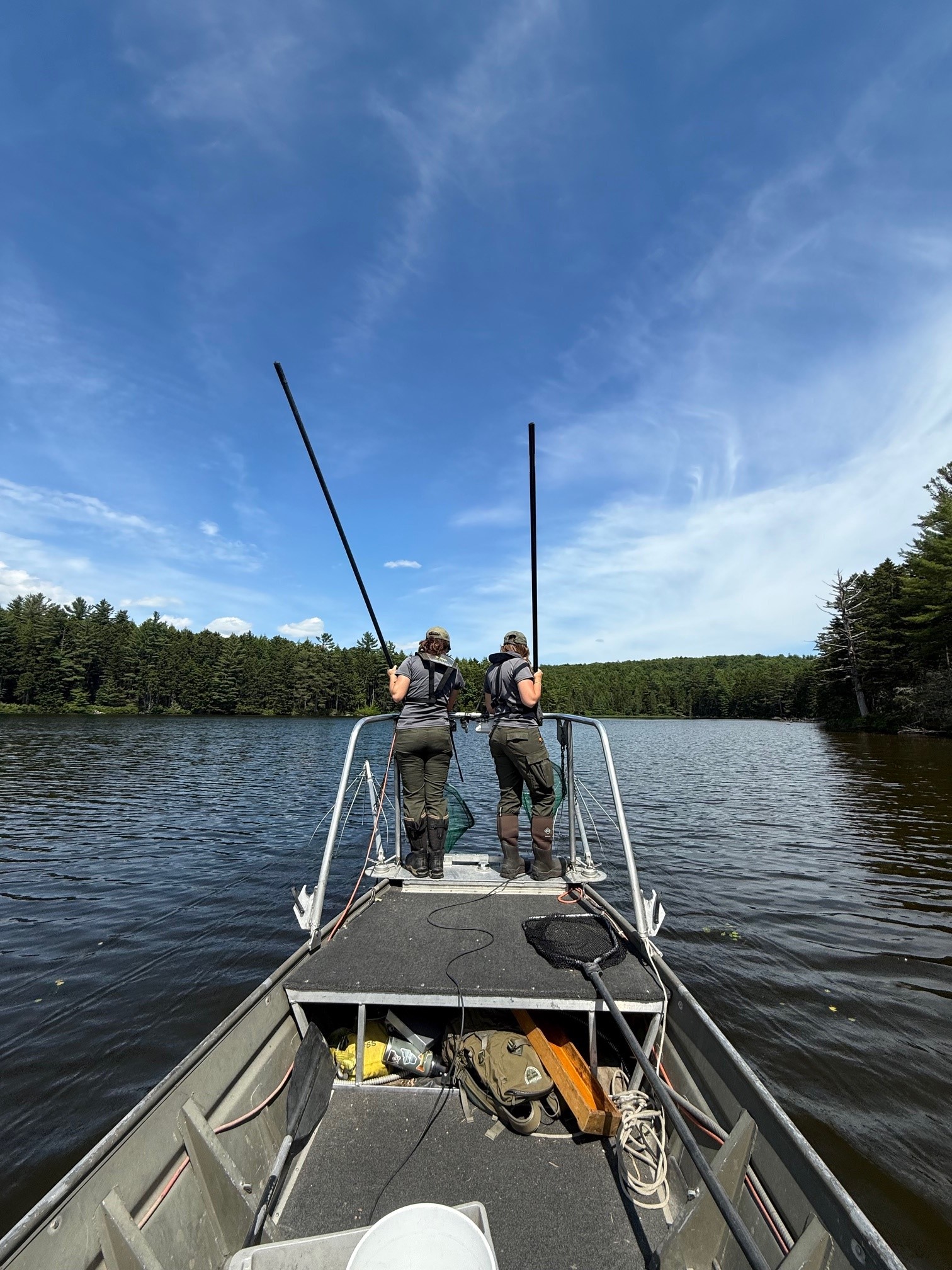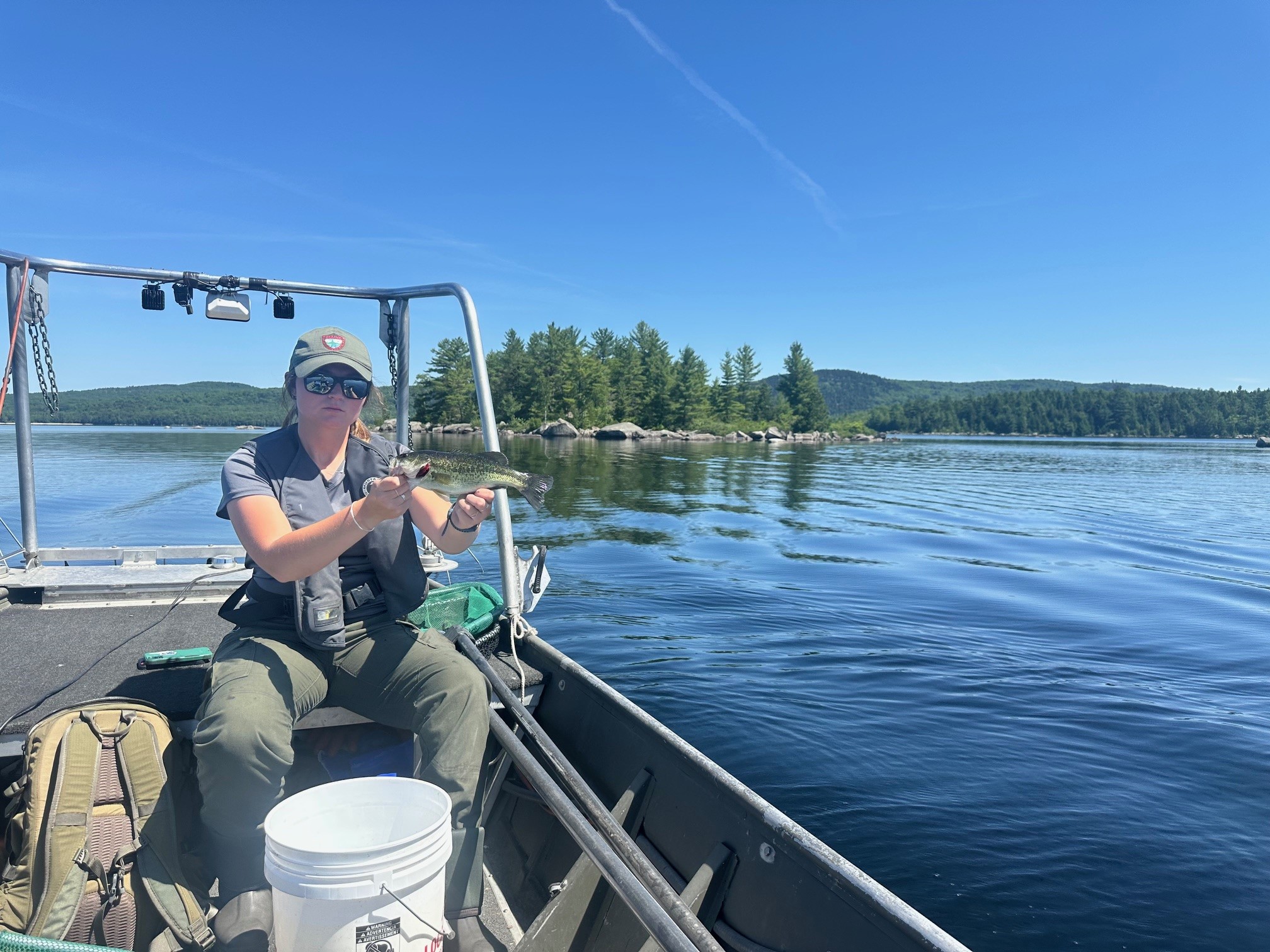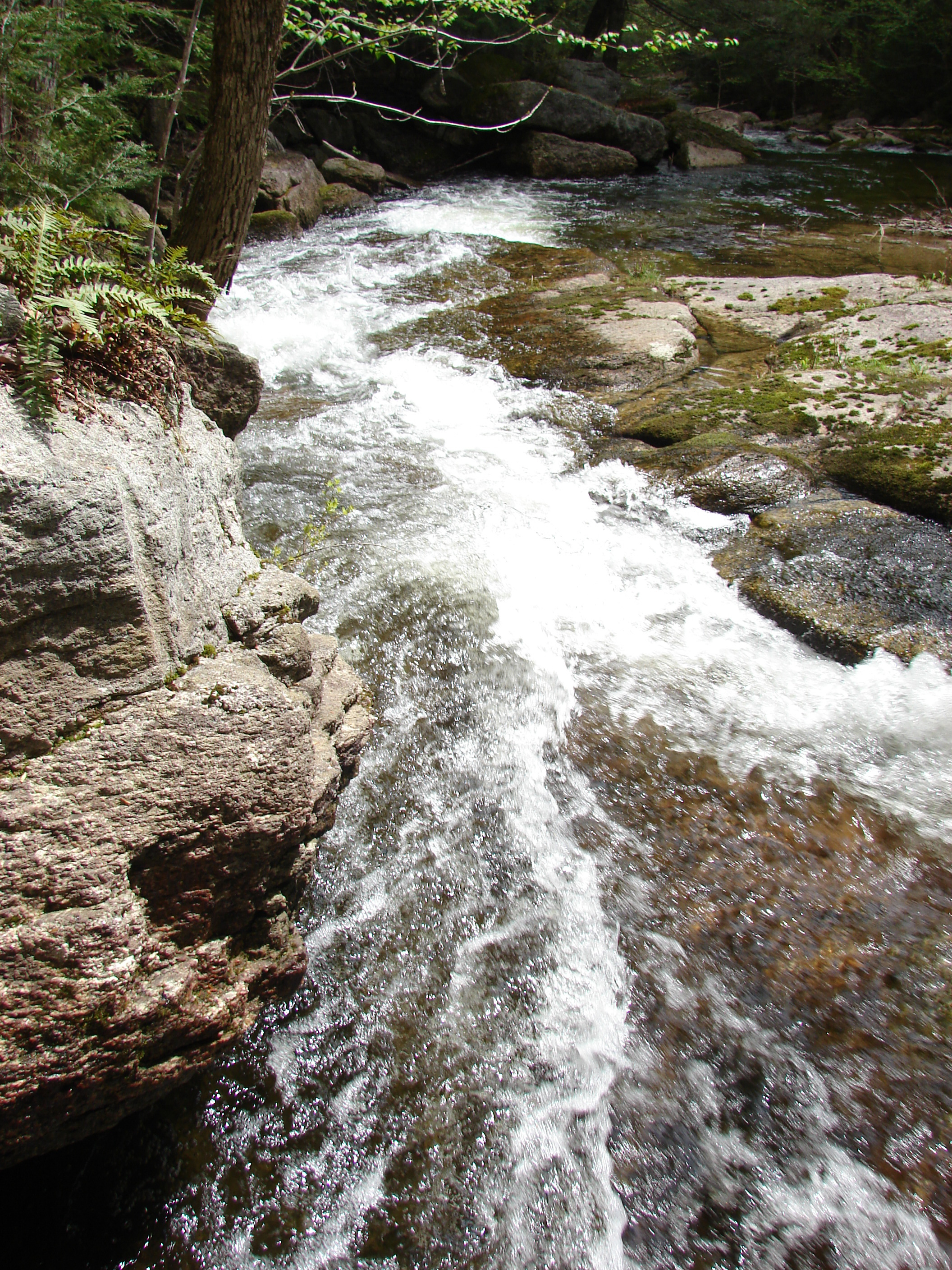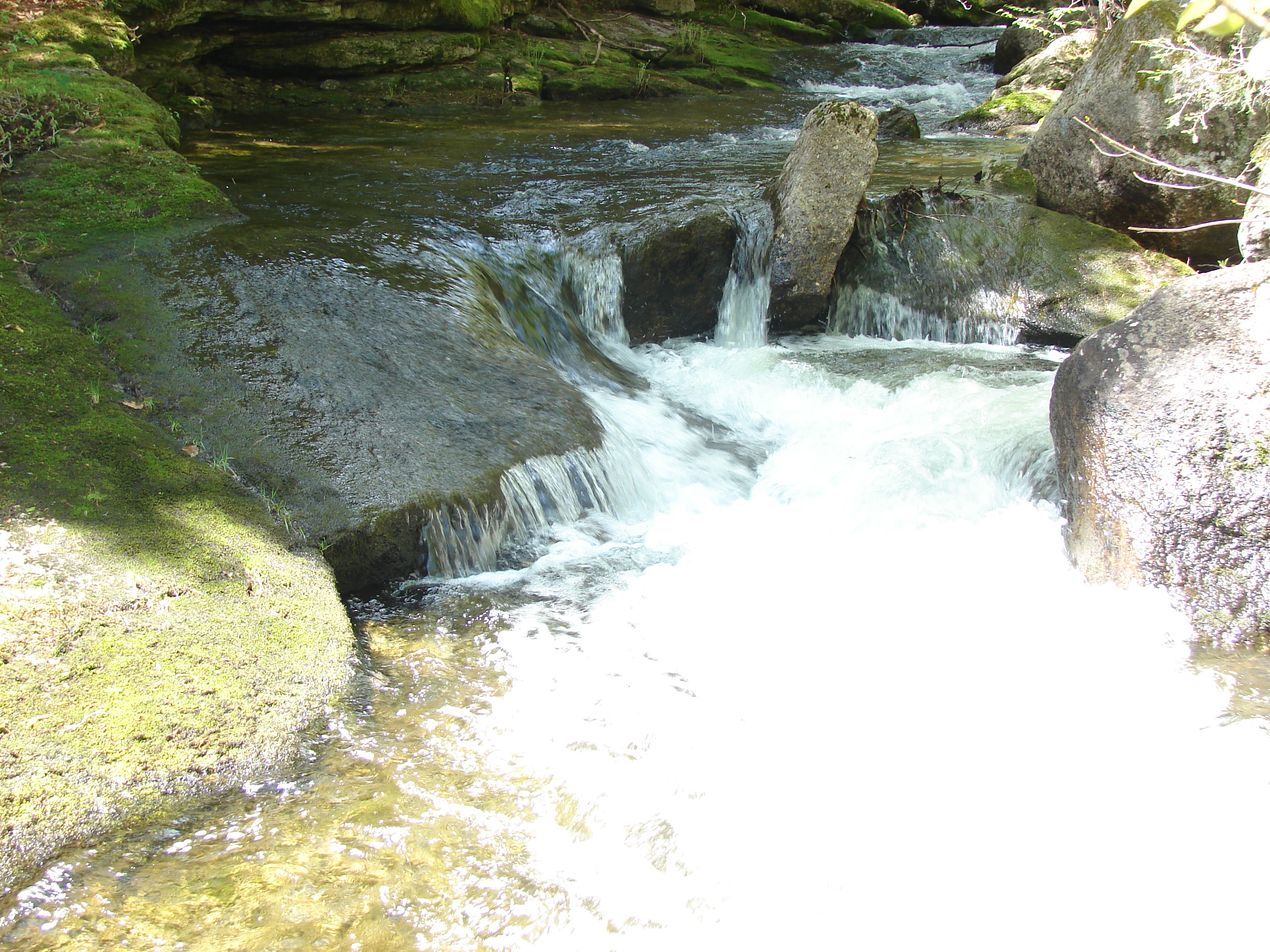August 25, 2025 at 3:32 pm
An investigation of an invasive fish in a native trout and salmon fishery
In early July we received a report from an angler who caught a largemouth bass in West Musquash Lake, an invasive fish species that could have devastating impacts on our native and coldwater fish species. A team of fisheries biologists from MDIFW and the Passamaquoddy Tribe investigated the report the very next week.

Unfortunately, we confirmed the presence of largemouth bass in the same area from the angler’s report. Using an electrofishing boat, biologists caught and confirmed multiple age classes and very likely fry (recently hatched fish). Electrofishing boats/ rafts use a generator to create an electric field in front of the boat which temporarily impairs fish so they can be netted by biologists.

To assess the spread of the invasive species, we launched another electrofishing boat into Orie Lake. Orie Lake is a small, shallow water located roughly 1.25 miles upstream of West Musquash. We theorized that an introduction could have occurred in Orie, and the largemouth bass could have moved downstream into West Musquash. We shocked the entire perimeter of Orie, and no largemouth were observed.

The outlet of West Musquash (West Branch of Big Musquash Stream) flows into Big Lake roughly 10 miles downstream. Big Lake has had a population of smallmouth bass for well over 100 years, and they have not migrated into West Musquash Lake. This barrier to upstream movement by bass is primarily due to the steep, narrow ledge section of the stream, which runs for about one mile downstream from the lake. Fisheries resource biologist Ashley Houle and fisheries technician Sierra Bryant hiked this section the following day to confirm past surveys. At low water levels, water funnels and cascades into shallow pools. Bass are unable to make these jumps. Additionally, long stretches of shallow water that flow down portions of bedrock act as upstream barriers. In high water events, these long stretches create enough flow at high velocities where bass cannot swim upstream through this section. If it were at all possible during any time of year, smallmouth bass would have moved into West Musquash long before this new introduction of Largemouth. Largemouth bass were introduced into Big Lake around 15 years ago and likely occupy the same waters in Big Musquash Stream as the smallmouth bass do. However, given what we know about largemouth bass habits, it is even less likely that largemouth bass would naturally migrate into West Musquash compared to the smallmouth.

A common question we have received is, couldn’t a bird be to blame for the introduction of this invasive species? While some research has been initiated to determine if birds can move viable eggs or live fish and start new populations, there is no evidence of this occurring in Maine to support this already highly unlikely theory.
We strongly feel this was an illegal introduction directly into West Musquash and Maine Warden Service is actively investigating the illegal introduction.
$6,000 Reward offered
The Grand Lake Stream Guides Association and Operation Game Thief are offering a $6,000 reward for information leading to the arrest and conviction of those responsible for illegally introducing largemouth bass into West Musquash Lake. Anyone with any information regarding this wildlife crime is encouraged to contact the Maine Warden Service or Operation Game Thief at 1-800-ALERT-US.
West Musquash is a 1,600-acre deep, clear, cold-water lake that is truly special to the Downeast region. The lake supports fisheries for wild landlocked salmon, wild lake trout, wild native brook trout, rainbow smelt (primary forage for the salmon and trout), and is also one of the last waters in the state with a population of round whitefish. The lake has virtually no development, with only four small camps. To access the lake from either end, it is a 4 to 5-mile drive on dirt roads. The Downeast region doesn’t have many of these waters; in fact, this is our only water in the Region that supports all these fisheries without an active stocking program. Sadly, this introduction will no doubt change the lake forever.
You are likely wondering, what can be done now?
Unfortunately, now that there is an established bass population in the water, bass will likely remain there forever and will compete with the salmonids for the same food and resources. A complete eradication of bass from the lake is highly unlikely given its size and location. The Department will encourage anglers who catch a bass in the water to harvest the fish. There is no size or bag limit for bass in West Musquash Lake [the Department removed these limits through emergency rulemaking in September 2025 to allow and increase harvest of the invasive species]. Biologists will continue to monitor the populations of lake trout, brook trout, and salmon to determine if regulation changes or a stocking program is necessary. We hope this irresponsible action serves as a reminder for all who enjoy Maine’s waters what’s at stake when an aquatic invasive species is introduced to Maine’s waters. It’s our duty as those who enjoy using Maine’s waters to become informed, attentive, and accountable for our potential role in the spread of invasive species and to take steps to protect Maine’s waters.
- Before and after entering a waterbody with any watercraft, always clean, drain, and dry.
- When fishing, remember that you must immediately kill any fish that you decide to keep, and never transport any live fish (other than legal baitfish).
- Never introduce fish or fish eggs into any inland water, including private, small, artificially constructed ponds, without a permit.
- Make sure you are using legal baitfish species. The best practice is to always check that you have legal baitfish, regardless of whether you legally harvested the baitfish yourself or purchased from a bait retail location or dealer. For a quick guide to identifying legal and illegal baitfish species see the Baitfish Information section.
- Don’t dump your bait! Properly dispose of unused baitfish on land or in the trash. Never release any live baitfish into a water body.
- Dispose of unused worms in the trash, not in the water or on land.
- When wading, consider using non-felt soled boots to further reduce the risk of spreading aquatic invasive species. If you do use felt soled boots, thoroughly dry the boots and/or soak in a disinfecting solution before moving to another body of water.
- If you see or suspect someone is moving live fish, contact the Maine Warden Service immediately at 1-800-ALERT-US or report the offense at MaineOGT.org
Thanks for staying informed and doing your part to keep Maine, Maine!